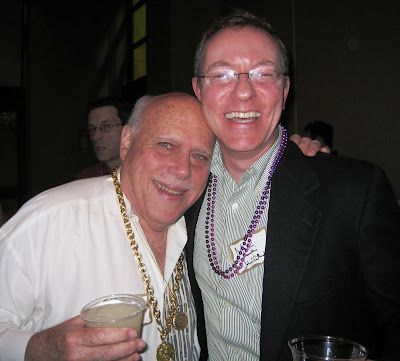Just posted to
Episcopal Life Online is this QUITE provocative opinion piece by Presiding Bishop Katharine Jefferts Schori -- reflecting on her recent meeting with the primates in Alexandria, Egypt. ENJOY!

Varied understandingsDifferent lenses provide different views of Scripture
[Episcopal Life] The primates' meeting has come and gone, and I'm sure there will have been abundant commentary by the time this is published. I'd like to reflect on some of the deeper issues behind our conversations about sexuality, particularly the influence of our understanding of gender.
The most intriguing conversation I had in Alexandria was with a primate who asked how same-sex couples partition "roles." He literally asked if one was identified as the wife and one as the husband, and then wanted to know which one promised to obey the other in the marriage ceremony. Several of us explained that marriage in the West is most often understood as a partnership of equals, and has been for some time.
Those of you with a few more years on you may remember that the marriage service in the 1928 (and earlier versions) of the Book of Common Prayer did indeed have language about the wife obeying her husband. It's pertinent here to note that the 1662 English Book of Common Prayer is still the norm in many provinces of the Anglican Communion, and it uses the same kind of language about obeying in the marriage service.
As I traveled from the airport to the hotel where we met, I noticed that almost every woman on the street past childhood was veiled, with at least her hair covered with a scarf, and in a not-small number of cases, covered head to toe in a long, flowing garment. I even observed a couple of women whose coverings were so thorough that I couldn't even see a slit for their eyes -- the fabric must have been thin enough for them to see through, but not for others to see in. The hotel had only a handful of female employees, mostly professional women who worked behind the desk. Only a couple of them wore no scarf.
The striking thing was that the meeting room where the primates' deliberations took place, the hotel's largest and principal conference room, was bedecked with several large paintings of half-naked women. It was a space that, in normal circumstances, apparently was used only by men. I found it striking that public expectations of women are modest dress and covering, yet there is evidently a rather different attitude toward men's entertainment.
These complex and conflicting gender expectations have something significant to do with attitudes there and in other parts of the world toward male homosexuality. The greatest difficulty in many cultures, including parts of North American society, is the perception that one of the partners in such a union must be acting like a woman -- and that is most definitely not a socially desirable status! It is an attitude directly involved in the handful of scriptural references to male homosexuality in the Hebrew Bible. The New Testament references have more to do with abusive and exploitative behavior.
At the same time, one could readily observe public behavior in Egypt that would be identified as same-sex affection in our own culture -- women and men holding hands with others of the same gender. Yet in that culture it is seen merely to express friendship and is not associated with sexuality.
All of which is to suggest that all of us read Scripture through the lenses we have -- our cultural norms, our scientific understanding and our theological understanding of the purpose of marriage. We also privilege particular parts of Scripture in the way we build our lectionaries.
One morning at worship at the primates' meeting, we heard the reading from Corinthians that says women should be quiet in church and ask their husbands at home if they have questions (1Cor 14:33b-35). It was followed by the Gospel passage that recounts Salome and Herodias' request for the head of John the Baptist. I don't believe that section of the Gospel, alone, is ever read at Eucharist in the Episcopal Church -- because there is precious little good news in it.
I had one other pertinent encounter in Fort Worth, Texas, after the primates' meeting. I was greeting a long line of people at the end of the day of the reorganizing convention for the diocese. I spoke with a man in a wheelchair who appeared to have had a stroke.
The next person in line began by telling me that the guy in the wheelchair was a retired obstetrician/gynecologist and that "he's the most interesting gay man I know, and I'm proud to call him a friend." Rather an unusual conversation starter. And then he went on to say, "All of this is really about male supremacy, isn't it?" His words, not mine, but worth consideration.
There is no longer Jew or Greek, there is no longer slave or free, there is no longer male and female; for all of you are one in Christ Jesus. Galatians 3:28
-- The Most Rev. Katharine Jefferts Schori is presiding bishop of the Episcopal Church.




















 Fr. Geoff Farrow, the Roman Catholic priest who chose conscience over compliance and defied his church's edict to support Proposition 8 in the November 2008 election will be a featured speaker at All Saints Church in Pasadena on Saturday, February 21st.
Fr. Geoff Farrow, the Roman Catholic priest who chose conscience over compliance and defied his church's edict to support Proposition 8 in the November 2008 election will be a featured speaker at All Saints Church in Pasadena on Saturday, February 21st.















